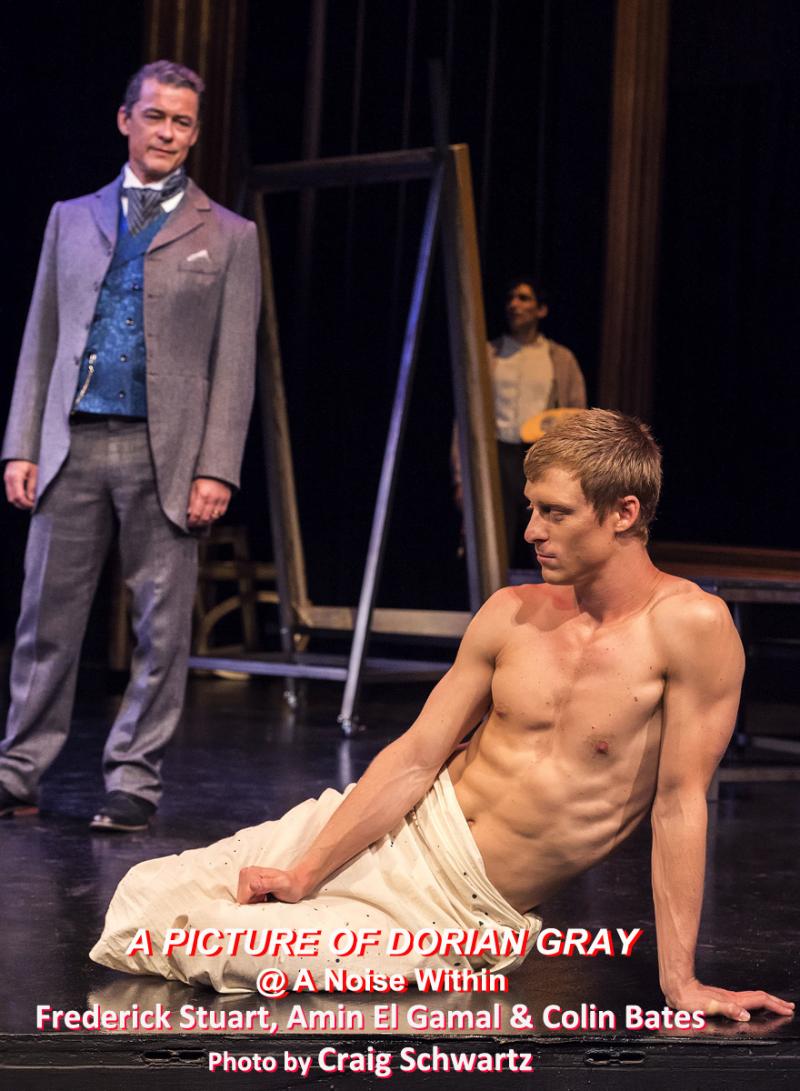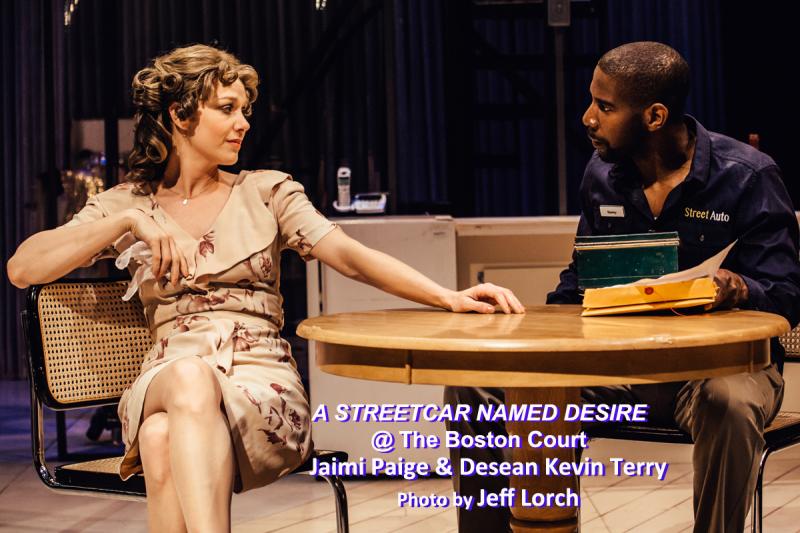Interview: Director Michael Michetti With Back-To-Back Oscars - Wilde, That Is

Prolific director Michael Michetti maintains his steady productivity of theatrical output with THE JUDAS KISS at Boston Court Pasadena, beginning previews February 15, 2019. After attending many of the shows he's helmed over the years, cosmic forces finally brought Michael and I together for this interview.
Thank you for taking the time for this interview, Michael.
Two of my favorite shows last year were directed by you: A STREETCAR NAMED DESIRE at Boston Court Pasadena and A PICTURE OF DORIAN GRAY at A Noise Within. I'm sure there are more shows I've enjoyed under your direction throughout the years.
Thank you, Gil! Those two productions were both personally meaningful for me, so I'm glad you enjoyed them so much.
You are currently in rehearsals for David Hare's THE JUDAS KISS. How's it going?
It's going great. I'm working with an incredibly talented and collaborative group of actors and designers who are finding all sorts of exciting dynamics and subtle nuances as we find our way through it. And we're working with a rich, beautiful play that is funny, thought-provoking, and deeply moving. It's a pleasure to go to work each day!
Had you seen a production of JUDAS KISS before?
I didn't see the original production with Liam Neeson in 1998, but I got the script and first read it soon after that production. I immediately fell in love with the play and have dreamed of directing it for the past twenty years. I finally saw it staged three years ago in the London revival, which was imported to BAM for a limited run in 2016. While I was glad to see that production, and I thought Rupert Everett was great as Wilde; I still felt there were aspects of David Hare's beautiful script that weren't fully realized. So I remained eager to get a stab at it myself one day. I believe ours is the first production in the Los Angeles area.
What particular aspect of JUDAS KISS called out for your director's touch?
Each time I read the play, I'm moved by the way Hare has dramatized the relationship between Oscar Wilde and Lord Alfred Douglas, better known as Bosie. The love between these two people is fraught and imbued with conflict, but the heart has reasons that reason doesn't understand. Oscar is not blind to Bosie's faults - in fact, he believes that his love allows him to see more clearly. Oscar says, "The everyday world is shrouded. We see it dimly. Only when we love, do we see the true person. The truth of a person is only visible through love. Love is not the illusion. Life is."
The historian looks at the suffering Oscar endured in his relationship with Bosie, his unwillingness to abandon him; and wonders, "Why?" In THE JUDAS KISS, the playwright tries to answer that question.
This is the second Oscar Wilde piece you've done back-to-back. Was this purely by circumstance or by planned design?
It was not by design, but neither was it entirely coincidental. As I was preparing to direct my adaptation of A PICTURE OF DORIAN GRAY for A Noise Within last year, I was re-reading lots of Wilde, and lots of things about Wilde. I again picked up THE JUDAS KISS, and was once more reminded how brilliant and moving the script is. It was about at that time that we were finalizing our 2019 season for Boston Court Pasadena. This play seemed to be the right fit with the other works we had selected for the season.
 It's a treat to continue living for a while longer in the world of Oscar Wilde. I've always been drawn both to Wilde's writing and to the man as a historical figure. The ways that DORIAN GRAY and THE JUDAS KISS resonate against one another are exciting to me.
It's a treat to continue living for a while longer in the world of Oscar Wilde. I've always been drawn both to Wilde's writing and to the man as a historical figure. The ways that DORIAN GRAY and THE JUDAS KISS resonate against one another are exciting to me.
I see you're re-united with your Dorian Gray, Colin Bates. (To check out my interview with Colin, click here.)
It's so interesting to be working with Colin on these projects back-to-back. In A PICTURE OF DORIAN GRAY, he played Dorian, a beautiful young man who ends up destroying the older artist who loves him. But it's interesting to note that Oscar Wilde wrote DORIAN GRAY in 1890, and it wasn't until the next year, in 1891, that he met Bosie. So now in THE JUDAS KISS, Colin is playing Bosie, who is again a beautiful young man who ends up destroying the older artist who loves him. The parallels are unmistakable, though the plays are very different. It's fascinating to navigate those parallels with Colin and it has been the subject of much discussion.
Who else in THE JUDAS KISS have you worked with?
The only other actor in THE JUDAS KISS who I had worked with before was Rob Nagle, who is playing Oscar, though this is our first full production together. We have been friends and colleagues for many years, but we had only worked together on readings previously.
You have directed countless actors in the Los Angeles area. Do you really even have to hold auditions anymore? Or do you just call up an actor and offer them a part that's you think is perfect for them?
Yes, I do know lots of wonderful L.A. actors, but I do usually have auditions. First of all, I always want to expand the pool of actors I work with, meet new artists and be exposed to new talent. Also, having them read from the script will tell you whether they're really the right fit for a particular role. Auditions where actors read with each other will tell you whether they have chemistry together.
However, there are exceptions. In the case of THE JUDAS KISS, I made the offer for the role of Oscar Wilde to Rob Nagle after only a coffee conversation about the play, as I knew his work so well, and I was confident that he would be a great fit for the role. I'm glad to say that my instincts were correct. He is as brilliant in the part as I thought he would be.
You adapted and directed DORIAN GRAY. In the press release of STREETCAR, it's described as a "re-imagined modern take of Tennessee Williams' A STREETCAR NAMED DESIRE." Did you 'adapt' STREETCAR also? You only took director's credit on it.
 In the case of DORIAN GRAY, it was an adaptation because the source material was a novel, not a play, and I wrote the theatrical adaptation. In the case of STREETCAR, we were contractually bound to use Williams' text word-for-word with no alterations. So the re-imagining of STREETCAR was all about casting, time period, playing style, use of music and design elements, etc. I hope that these production choices allowed audiences to hear Williams' brilliant play with fresh ears, as though it was a new play and contextualized for a modern audience, but the text was all Tennessee Williams!
In the case of DORIAN GRAY, it was an adaptation because the source material was a novel, not a play, and I wrote the theatrical adaptation. In the case of STREETCAR, we were contractually bound to use Williams' text word-for-word with no alterations. So the re-imagining of STREETCAR was all about casting, time period, playing style, use of music and design elements, etc. I hope that these production choices allowed audiences to hear Williams' brilliant play with fresh ears, as though it was a new play and contextualized for a modern audience, but the text was all Tennessee Williams!
In your youth, what did you initially want to be when you grew up?
I sort of always knew that this was what I wanted to do. My parent began taking me to the theatre as a small child, so I was exposed to it very early. As a kid, I was always trying to convince the neighbor kids to make plays with me in the backyard. I feel so fortunate to still be doing what I love, and to have the opportunity to tell stories that are important to me.
As steadily as you work in theatre, are you able to go to see a show as a civilian audience member? Or does it take a few scenes for you to take off your director's cap and just sit back?
It's a great question. First of all, I am a voracious theatergoer. I see dozens of productions, often over a hundred, in any given year. I love the theatre. I love supporting my fellow artists. I love the life-long learning and inspiration that have come from my theater-going. But of course, I do know how the sausage is made, so I often find myself observing work through that lens, and yes, I frequently do analyze a production while watching.
I often see productions that make choices which are different than those I would have made. But if a production succeeds on its own terms, if it makes a thoughtful and valid case for a particular interpretation or approach even if it's different than mine; I'm happy to go with it. In fact, it's often in those instances when my mind and heart are opened up to new ideas, and when I'm truly inspired. And if I begin to feel my heart racing and find myself being moved by a production, I stop analyzing and just allow myself to be swept up in the experience. It is then that I know that the artists have created something truly special. And that has happened to me countless times in the theatre. I'm grateful for all the theatre-makers who have given me so much magic and inspired me throughout a lifetime of theater-going.
I am so glad to finally get the chance to interview you. Thank you for taking the time for this, Michael! I look forward to seeing your KISS with Oscar!
Thanks, Gil. I appreciate the opportunity to talk with you!
For ticket availability and show schedule through March 24, 2019; log onto BostonCourtPasadena.org
Comments
Videos

